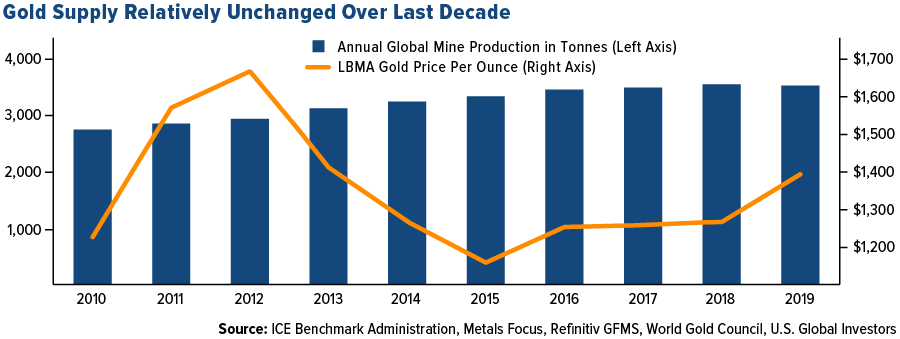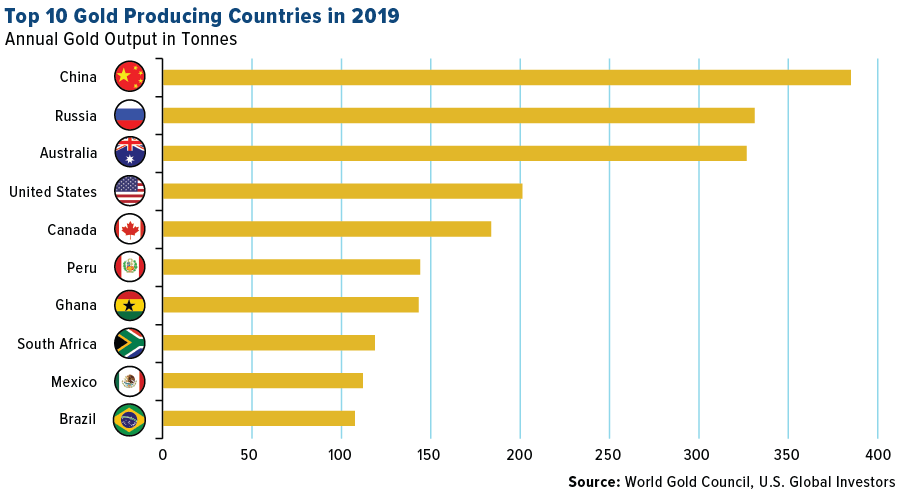Top 10 gold producing countries

Gold is one of the rarest elements in the world, making up roughly 0.003 parts per million of the earth’s crust. But how much gold is the world digging up each year and what countries produce the most?
In 2019, global gold mine production was a reported 3,463.7 tonnes – down one percent from the year prior – and the first year-over-year decline in output since 2008. Gold production has remained relatively steady since 2010, raising the question I’ve explored over the years – have we reached peak gold?

The idea is that all the easy gold has already been discovered and explorers have to dig deeper to find economically viable deposits. For example, South Africa was once the top gold-producing country by far, digging up over 1,000 tonnes in 1970, but annual output has fallen steadily since. On the other hand, several nations have emerged in the last few years as growing gold producers.
As seen in the chart below, China takes the number one spot of global gold producers by a wide margin. The top 10 rankings saw a big shift in 2019 – Russia took the lead over Australia to claim second, Indonesia fell off the list and Brazil joined the ranks as the tenth largest producer. Ghana also jumped ahead of South Africa to become the continent’s top producer.

Below are more details on the top 10 countries with the largest gold production in 2019, beginning with the top producer and top consumer of bullion, China. All data is from the World Gold Council.
1. China – 383.2 tonnes
For many years, China has been the top producing nation, accounting for 11 percent of global mine production. However, production fell from nearly 400 tonnes last year, representing the third consecutive year of declines. The downtrend is largely due to tighter environmental policies imposed by the government. For example, stricter control over the use of cyanide at gold mines forced several operations to cut back production.
2. Russia – 329.5 tonnes
A massive 83 percent of European gold comes from Russia, which has been increasing its production every year since 2010. Russia took the lead over Australia to become the world’s second largest producer – mining 50 tonnes more in 2019 than the year prior. Who is the largest buyer of Russian gold? The Russian government, of course, which purchases around two-thirds of all gold produced locally.
3. Australia – 325.1 tonnes
Australia has posted seven consecutive years of increases in production, up by 4 percent in 2019. The minerals industry produces over half of Australia’s total exports and generates about 8 percent of GDP. Higher production at several mines and the ramp of projects such as Mount Morgans and Cadia Valley contributed to increased production.
4. United States – 200.2 tonnes
American gold output fell by 11 percent in 2019, ending five consecutive years of growth. Twelve states produced the gold, worth about $8.9 billion and accounting for 6.1 percent of the global total. Around 78 percent of gold produced in the U.S. is from Nevada. If the state was considered a country, it would be number six on this list with 173.6 tonnes mined in 2019.
5. Canada – 182.9 tonnes
Canada has held the number five spot for three years now, even with a slight decrease in output in 2019. New projects in Nunavat, Yukon and Quebec are expected to support stronger output in 2020. Canada’s gold mine production is estimated to grow by a compound annual growth rate of 2.7 percent from 2019 to 2023 to reach 7.6 million ounces.
6. Peru – 143.3 tonnes
Gold output fell for a fourth consecutive year in Peru largely due to crackdowns on illegal mining operations in the La Pampa region and lower grades at existing projects. Mining is a significant portion of Peru’s economy and accounts for over 28 percent of the region’s total output.
7. Ghana – 142.4 tonnes
Ghana is Africa’s largest producer of gold, beating out South Africa for the top spot in 2019, and is also known for its reserves of various industrial minerals. Industry majors such as AngloGold Ashanti and Gold Fields have shifted their focus from South Africa to Ghana where deposits are cheaper and easier to mine. The West African nation has around 1,000 metric tons of reserves and moved up to number seven on the list from 10 last year.
8. South Africa – 118.2 tonnes
Once the top gold-producer in the world by a wide margin, South Africa’s gold mines have been slowing every year since 2008, with the exception of 2013 when production rose by a few tonnes. The nation is struggling with rising costs for electricity and labor, with many mines closing due to unprofitability. South Africa is, however, still home to the world’s deepest gold mine, the Mponeng mine, extending 2.5 miles underground.
9. Mexico – 111.4 tonnes
Although production fell for a fourth consecutive year, Mexico remains a competitive gold source. Output has risen from just 50.8 tonnes in 2008 to over 130 tonnes in 2017, one of the largest increases in a nine-year span. Mexico is an attractive place for mining due to a relatively low cost of regulation. The 2019 slowdown is attributed to disputes between local communities and contractors.
10. Brazil – 106.9 tonnes
Brazil produced 10 more tonnes of gold than the year prior to make the number 10 spot on this list. Illegal mining activity has risen sharply in the last five years in the heart of the Amazon rainforest. President Jair Bolsonaro has pushed the country to develop the Amazon economically and tap its mineral riches.
(This article first appeared in U.S. Global Investors)
More News
{{ commodity.name }}
{{ post.title }}
{{ post.date }}




3 Comments
Masuka Talkmore
More research on how to improve exploration texhniques
Sophian Oemar
Indonesia was producing 109 kT gold in 2019, should be no. 10 on the list.
Sophian Oemar
Typo 109 tonnes